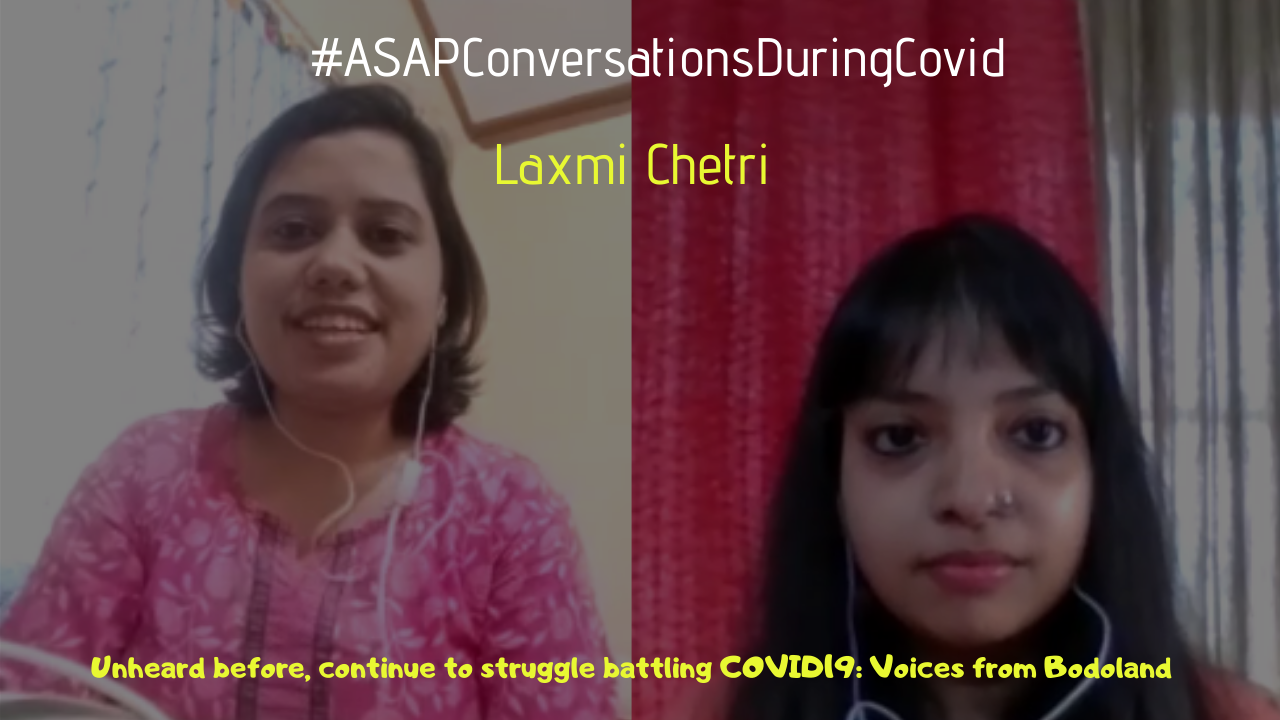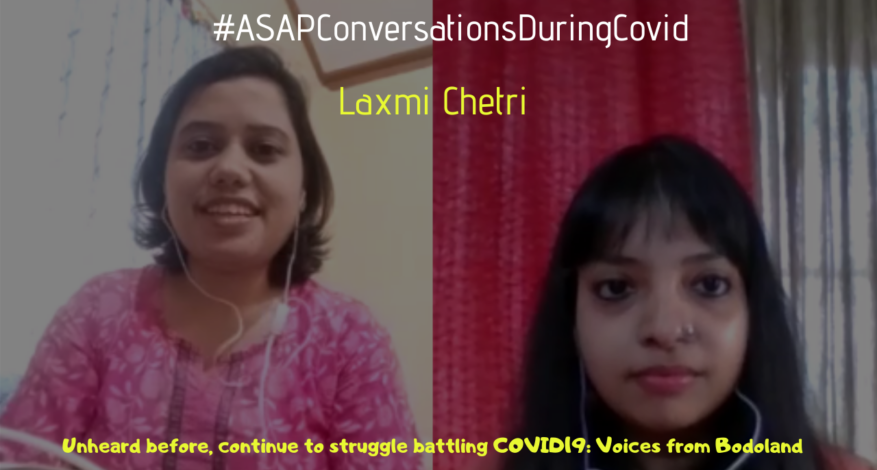Unheard before, continue to struggle battling COVID19: Voices from Bodoland with Laxmi Chetri
Our guest today is Laxmi Chetri from The ANT, Assam in conversation with Nandini Mazumder, Assistant Coordinator, ASAP.

These are the highlights of an episode from the ASAP Covid19 conversation series where we invite guests to have conversations with us around the current situation, the pandemic and especially in relation to the communities we work with, and how it has affected the people specially in relation to abortion rights and larger SRHR access. The interview was conducted by Nandini Mazumder, Assistant Coordinator, ASAP.
To see the video go here
For SoundCloud visit this link
Transcribed by Garima, Youth Champion- India & edited by Dr Suchitra Dalvie
Laxmi– Hello everyone, my name is Laxmi, and I work with the organization The Action Northeast Trust (The ANT). It’s an organization working in a district called Chirank in Assam, it is under Bodoland. My organization works in different areas, like one of the areas is mental health, also on children and women development. During this pandemic we are also doing some relief work. The area I work in is one of the regions which is always left out.
Nandini– Thank you Laxmi. Just to get more clarity, who are the communities that you work for?
Laxmi– We work with Bodo, since it is Bodoland, so it’s the majority and the other community which is high in number here are Bengali Muslims. There are also Assamese, Nepali, Santhil, Adivasi and other tribes. We work with men, women and children.
Nandini– Thank you Laxmi, so that gives us a picture of the difficult terrain, region, conflict and also the extreme marginalization that the people that you work with face.
What was the situation like before covid-19 ? It is 70+ years since India’s independence but there are still these parts of the country that are extremely underdeveloped. So, if you can give us a bit of that picture and specially in relation to abortion rights and SRHR access.
Laxmi– The area we work in is a 3 hour journey from Guwahati. There were no doctors in the hospitals and people from other parts of Assam used to feel scared coming here because violence that took place in 1996-97 and 2012-13. Now people have this mindset that these communities are violent communities, so better not go there. So it had become really difficult to get health facilities and good doctors here, and the services in the government hospitals were not good. Even before the pandemic, if a woman has to get an abortion, she has to go far distances maybe 20,30, or even 50 kms. We also work on gender-based violence, so we get a lot of cases of domestic violence too and after the lockdown they have increased. In fact we feel that less reporting has been done regarding the same during the lockdown, as our outreach has decreased. We think many women would be facing torture, but they are unable to reach us because they don’t have access to mobiles, internet.
Whenever women used to come to us, they reported about sexual violence too. They used to talk about things which they can’t openly talk about in their social circles. Here in our culture, whenever there is violence, the society tries to resolve it in traditional ways and it’s always not in the favor of women and they are blamed. Even today in our society, women have no say in their own matters, like whether they want to continue with their pregnancy or not.
It’s not a one-day decision for any woman, if she decides she has to get an abortion, then she would have to travel far away to avail those services. Even the ASHA workers don’t have the contraceptive pills with them every time. So, many women end up using unsafe abortion practices.
All this was happening before covid too.
Nandini– So important takeaways, from what you told us are that power dynamics have always been skewed in our patriarchal society. Everything works mostly in favor of men, all the decisions taken in the home and in society are mostly to favor men and all these situations leave women at risk for violence. The National Commission for Women is also saying there are increased calls to the helpline and this is not only in India, this increase in gender based violence during this pandemic is a global phenomenon. So, how is this current situation affecting people who you work with? They were already in remote areas, already marginalized, so what is the current situation?
Laxmi– Before we would ask the ASHA workers how many contraceptive pills were available with them, the number of eligible couples etc but after the lockdown even the everyday birth control pill is also not easily available. Earlier women could travel to the nearest ASHA and take it but covid has scared everyone and now I know of many women who are continuing with unwanted pregnancies.
Even in hospitals, because all the focus is on covid-19, other services that need attention are neglected. A few days back a couple came to us, the woman was 9 months pregnant. She went to the civil hospital for delivery, from where she was referred to a private hospital. They were told they could use their health card for the delivery, but since it was not a normal delivery and it was a private hospital, they were charged around 15,000 Rs. They belonged to a very poor family and then they came to us to ask for help and that’s how we came to know that people are not getting proper SRHR services in the hospitals.
Nandini– Thank you Laxmi for voicing such important points. The most important thing to note here is that for a lot of women, queer people, trans people, children, it is usually believed that it was stranger danger, but it’s a myth. The most danger is in your households and it is those close to you who can attack you. These are things which are not thought about when policies are made or when lockdowns are enforced— that home is not a safe place for everyone. Many women, children, queer people are suffering because they don’t have power, and hence they are stuck in a situation where it is easy for any kind of violation to happen. Thank you Laxmi for bringing these points. I had a follow up question, as you work with ASHA workers, they have a huge role at the ground level in health services, SRHR services and now in covid-19 too. They are mostly women and they are also part of our society, the pay is not much, so could you tell us what kind of issues they face?
Laxmi– ASHAs are in the frontline, they are only helping women. I know some ASHAs who walk long distances of 10-15km to hospitals just so that women can get these services. But if medicines are not made available by the hospital, how would ASHA provide eligible women with it?
Nandini– Have they received protection gear in covid-19, things like masks, gloves?
Laxmi– Yes, all those things are made available to them.
Nandini– That is a good step from the government, because they are also frontline workers. When we clap for frontline workers, we forget about ASHAs because they work at a ground level and our health system depends on them.
So, maybe our systems were not working even earlier and covid 19 has just made it apparent. But in order to create a new system which is more participatory and where every one is included, what do you think we can learn from this moment? If you had to keep some demands in front of the law makers what would that be?
Laxmi-In the Indian society, we view women’s sexuality with a lot of shame, we need to change our mindset about it. Also, women are so subjugated, that although many welfare laws have been passed, but at the level of implementation they are not in the favor of the woman. Like the domestic violence law– many times the woman has to compromise through counselling. If a woman comes to us, in our district we don’t have a shelter home. If a woman has an unwanted pregnancy, there is a lack of services for women to access safe abortions. Currently, women only have to compromise, because men hardly use condoms. Again women have to either use copper T or Mala-D(Birth control pills) regularly. If she even misses one day, they are scared of getting pregnant. So, if every hospital had abortion services, that would be nice.
Nandini– Thank you Laxmi, your opinions are so important because in this series we want to get voices from varied regions






